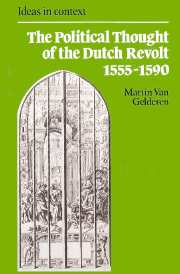Book contents
- Frontmatter
- Contents
- Preface
- List of abbreviations
- 1 Introduction
- 2 The Dutch Revolt: historical contexts
- 3 Religion and resistance: the case of Reformed Protestantism
- 4 Politics and resistance: the political justification of the Dutch Revolt
- 5 From revolt to republic: the quest for the best state of the commonwealth (1578–1590)
- 6 Politics and religion (1572–1590): the debates on religious toleration and the substance of liberty
- 7 Conclusions: the Dutch Revolt and the history of European political thought
- Appendix: a note on primary sources
- Bibliography
- Index
- IDEAS IN CONTEXT
3 - Religion and resistance: the case of Reformed Protestantism
Published online by Cambridge University Press: 15 December 2009
- Frontmatter
- Contents
- Preface
- List of abbreviations
- 1 Introduction
- 2 The Dutch Revolt: historical contexts
- 3 Religion and resistance: the case of Reformed Protestantism
- 4 Politics and resistance: the political justification of the Dutch Revolt
- 5 From revolt to republic: the quest for the best state of the commonwealth (1578–1590)
- 6 Politics and religion (1572–1590): the debates on religious toleration and the substance of liberty
- 7 Conclusions: the Dutch Revolt and the history of European political thought
- Appendix: a note on primary sources
- Bibliography
- Index
- IDEAS IN CONTEXT
Summary
INTRODUCTION
The purpose of this chapter is to reconstruct how Dutch Reformed Protestants faced the questions concerning the attitude the faithful should take with regard to a hostile, persecuting government and whether they developed a distinct Reformed Protestant approach to the questions of political obedience and resistance which had troubled Protestants throughout Europe from the very beginning of the Reformation.
Luther himself had set the tone for Reformation political thought on these issues, following the basic tenet of texts such as the thirteenth chapter of Paul's letter to the Romans, 1 Peter 2 and the fourth commandment. All of them emphasized that obedience was a divine command. As the earthly powers were ordained by God to protect the good and to punish the wicked, ‘he who resists the authorities, resists what God has appointed’, as Romans 13:2 put it. However, Luther's emphasis on obedience and non-resistance was by no means unqualified. From the outset he pointed out, again following the scriptures, that one should obey God rather than men, and that therefore the faithful were obliged to disobey worldly authorities whenever these ordered anything that was ungodly. Moreover, from October 1530 Luther started to waver in his support for the idea of absolute non-resistance, with which he had so ferociously condemned the German Peasants' War.
- Type
- Chapter
- Information
- The Political Thought of the Dutch Revolt 1555–1590 , pp. 62 - 109Publisher: Cambridge University PressPrint publication year: 1992

